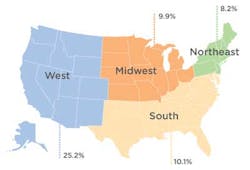Is dental tourism threatening your practice?
Information provided by systems research group Software Advice
It’s no secret that dental tourism attracts people away from U.S.-based dentists in the name of saving money, much to the frustration of U.S. dentists who feel they can offer better and less risky care. And it’s not just the uninsured who are fleeing outside U.S. borders as many believe, but also middle class people who have dental insurance.
RELATED READING: Is risk of 'foreign' dental treatment worth the savings?
The dental systems research group Software Advice surveyed a random sample of 1,155 U.S. patients in order to identify what issues might persuade those most likely to travel for dental care to reconsider their travel plans. It falls on dentists to persuade patients of the long-term value of American dental care.
Since knowledge of the health risks involved were the most convincing deterrent for potential dental tourists, the survey also asked patients how they’d like to be informed of these risks. The results showed that the majority of patients (43%) would prefer to have an in-office conversation with their dentist. In-person communication is one of the most effective ways to decrease anxieties and remind patients of the benefits and value of ADA-certified dental care, followed by a poster or brochure, website, and new patient packet.
The survey asked people about their primary concerns before undergoing dental care, and cost was the most prevalent answer at 41%, followed by no concerns at 35%, time for treatment recovery at 16%, and pain/fear at 9%.
Who’s willing to travel abroad for their dental care? It would appear that those who live in the West are the most eager to seek a bargain overseas, with 25.5% of respondents living in the western part of the U.S. This is followed by the South at 10.1%, Midwest at 9.9%, and Northeast at 8.2%.
While it is not a huge threat to American dental care (with only 17% of those surveyed expressing an interest), dental tourism is growing as access to the Internet grows and patients educate themselves about their choices, and as other countries improve dental care in order to attract a growing number of tourists.
Dentists need to have an honest conversation with their patients about the advantages of staying in the country for their dental care, not the least of which is patient famiiarity with the dental team, U.S. regulated care, and immediate access to care if they have any problems.
RELATED READING:126.7 million Americans in need of dental care options
Obamacare and the dental industry: Part I
While only 17% of insured Americans said they had an interest in dental tourism, that will likely increase as dental care improves in other countries. If dentists want to keep their patients and dollars here, they need to address the issue. This survey reveals that an honest conversation with patients has the best chance (43%) of persuading them to stay in the U.S. for their dental care (followed by brochure/poster, website, and new patient packet), where there are often more regulations making sure they receive quality care, better payment plans, and of course, the familiarity of their dental team. Use that to your advantage and keep patients in the U.S. under the care of ADA members!



